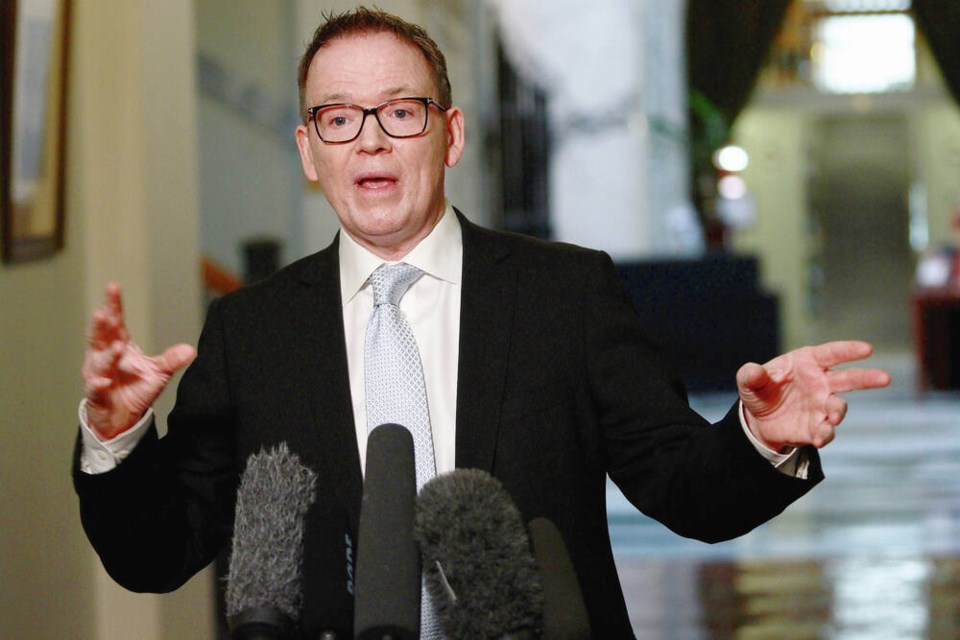With Premier David Eby’s NDP lagging behind combined support for BC United and the B.C. Conservatives, the question becomes: Will we see a merger of the two right-of-centre parties?
In an online poll of 800 adults conducted by Vancouver-based Research Co. May 13 to 15, the NDP are at 42 per cent approval, down two points from the last time.
John Rustad’s Conservatives stand at 32 per cent, a climb of six points, while Kevin Falcon’s BC United have the backing of just 12 per cent of potential voters, a fall of two points. In effect then, if Rustad’s and Falcon’s parties merged, and if both kept their share of the vote, they would lead the NDP by two points.
Of course those are two very big “ifs”.
There are significant obstacles in the way of a merger, not least that there are only five months until the next provincial election. That’s not a lot of time to pull together what would be a major reorganization.
Yet the history of divide-the-right movements should give both Rustad and Falcon reason to consider a merger.
In the 1993 federal election, Preston Manning’s Reform Party arrived on the scene. Manning had been furious with outgoing prime minister Brian Mulroney, whose centrist policies he deplored.
In that election, the Reform Party came a distant second to the resurgent Liberals, winning just 52 seats to the Liberals’ 177.
Much the same happened in 1997, and again in 2000, with Reform never gaining more than 66 seats. In effect, all Manning accomplished was to hand the Liberals four victories in a row. So much for breathing new life into conservatism.
In the 2006 election, after Reform had reunited with the Tories, Stephen Harper went on to form three consecutive governments.
Fast forward to the Alberta election in 2012. Here the Wild Rose party, with a platform well to the right of the governing Conservatives, ran its first slate of candidates. They took only 17 seats and the Conservatives held on.
But in 2015 Wild Rose won 21 seats, the Tories were all but wiped out and the result was an NDP victory, the first in Alberta’s history.
As with the Reform experiment, all Wild Rose accomplished was to elect a government with views near the opposite of its own.
By 2019, Wild Rose and the Conservatives had joined, once again electing a Conservative administration.
So does a merger of the two right-of-centre parties here in B.C. make sense? Politically speaking, it surely does.
But logistically, it’s another matter.
For a start, the Conservatives have only two seats at present in the legislature, and neither of its members was elected as a Conservative. Both won their seats as B.C. Liberals.
In contrast, BC United — the Liberals under a new name — has 26.
In any attempt at a merger, Falcon would surely expect the distribution of candidates in the October election to represent that fact. But could the resurgent Conservatives agree?
Certainly there is little between the two parties in ideology. And the few points on which the Conservatives differ, like Rustad’s airy dismissal of global warming, are probably vote losers in a provincewide election.
Yet the lesson from the Reform and Wild Rose experiments is that only a beating at the polls will bring about a merger.
The same might hold true here. Last week an attempted deal between Falcon and Rustad appears to have collapsed, with each pointing fingers at the other and demanding a larger share of seats.
Whether this is posturing remains to be seen. It’s conceivable that the two right-wing parties, running separately, might still win enough ridings to form a coalition government.
However, at this point, it looks like the only beneficiaries of a divide-the-right strategy will be Eby’s NDP.
>>> To comment on this article, write a letter to the editor: [email protected]



